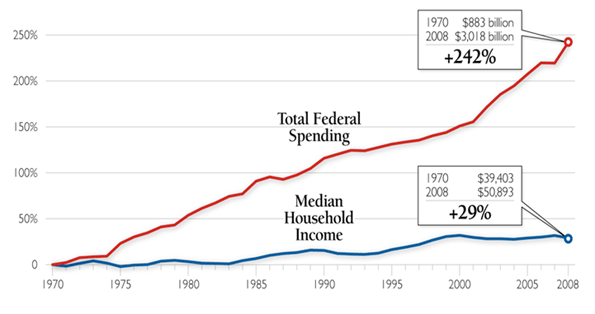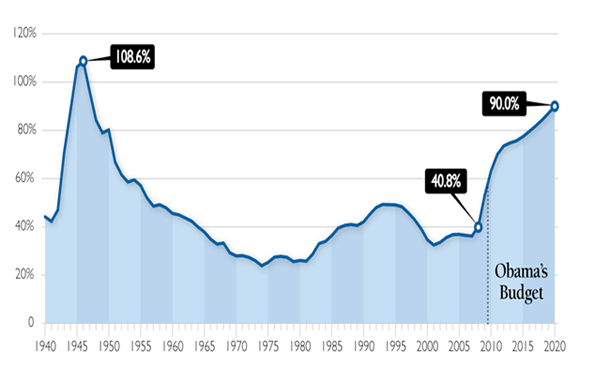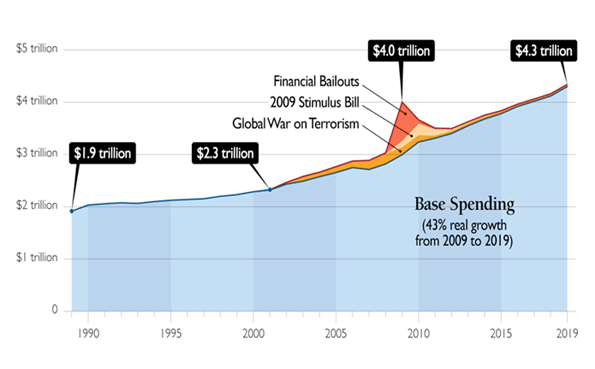
There is a great battle brewing – the proverbial paradox of the immovable object versus an irresistible force. The battle lines are drawn. On one side is the Greatest Generation, Americans over 60, middle class and mostly white. Mainstream media calls them The Tea Party and worse.
On the other side is President Barack Obama and a younger generation of progressive Democrats who see the need for an ever more expansive government. The battlefield is spending and debt. The Greatest Generation, following World War II, bought homes with a 30-year mortgage and 20% down, and paid off those mortgages accumulating trillions in equity along the way. The Credit Card Generation – epitomized by both George W. Bush and his Democratic successor – nurtured the zero down, no doc, adjustable rate mortgage that allowed millions of homebuyers, who could not afford to purchase a home, to buy one. The bursting of the housing bubble cost trillions in lost equity and resulted in 2.8 million foreclosures in 2009.The figures tell the story.
Spending
According to the Office of Management & Budget (OMB), Federal spending has grown more than eight times faster than Household Median Income. Since 1970, middle-income Americans’ earnings have risen 29 percent, but federal spending has increased 242 percent (Percentage Change of Inflation-Adjusted Dollars, 2009). The Greatest Generation believes that spending by Washington politicians has grown out of control. They understand it is not a Republican or Democrat issue. They opposed the $800 billion TARP Bailout under Bush as much as Obama’s $800 Stimulus Bill. They opposed the trillion dollar Healthcare Bill recently enacted into law despite a clear majority opposed to its passage. They recognize that Social Security and Healthcare comprise huge unfunded obligations that will be passed on to their grandchildren.

Source: Heritage Foundation
Debt
Since World War II, publicly held debt as a percentage of the economy (GDP) has remained below 50%. In 2008 when President Obama took office, it was 40.8 percent, nearly five points below the post-war average. According to the OMB, Obama’s budget would more than double this figure to 90 percent of Gross Domestic Product by 2020, levels not seen since World War II. (Greece’s debt level of 150% precipitated their meltdown). By 2020, Americans will spend more on interest payments on the Federal debt than on military spending. The Greatest Generation believes these debt levels to be unsustainable.

Source: Heritage Foundation
An Unsustainable Path
In 1990, the federal budget was less than $2 trillion. Ten years later the federal budget was just $2.3 trillion. By 2010 the budget exploded to $4 trillion. The Obama budget projects a 43% growth to $4.3 trillion by 2019 according to the OMB. This massive increase over the $2.9 trillion budget Obama inherited in 2008 is not due to emergency spending alone but an intentional structural growth in government. Federal revenues have not kept pace with spending. The U.S. government was forced to borrow $1.5 trillion to pay its bills last year. The national debt is projected to increase from $13 trillion to $20 trillion by 2020 (Inflation-Adjusted Dollars, 2009). The path is unsustainable.

Source: Heritage Foundation
While the classic paradox of the immoveable object versus the irresistible force can never be solved, this battle will be settled at the ballot box in 2010 and 2012 when Americans determine the path their country will follow in the 21st Century. If the Greatest Generation prevails, many incumbent politicians will find themselves out of a job as collateral damage. A new wave of politicians will begin The Great Deconstruction.
New Jersey Governor Chris Christie may be the prototype of this new generation of politicians. He was elected to deconstruct the dysfunctional government of New Jersey, an economy that resembles Greece. Christie inherited the nation’s worst state deficit — $10.7 billion out of a $29.3 billion budget. Christie is doing something unusual, honoring his campaign promises and acting like his last election is behind him. Christie epitomizes the politician the Greatest Generation craves, one willing to lose his job.
Christie has already declared a state of emergency, signed an executive order freezing spending, and cut $13 billion in spending – in just two months. His first budget included 1,300 layoffs, cut spending by 9%, and privatized government services. The deconstruction of New Jersey has begun. New Jersey may be an unlikely place for The Great Deconstruction to begin, but it is a harbinger of things to come.
The Great Deconstruction is a series written exclusively for New Geography. Future articles will address the impact of The Great Deconstruction at the national, state, county and local levels.
Robert J. Cristiano PhD is the Real Estate Professional in Residence at Chapman University in Orange County, CA and Director of Special Projects at the Hoag Center for Real Estate & Finance. He has been a successful real estate developer in Newport Beach California for twenty-nine years.
Other works in The Great Deconstruction series for New Geography
The Great Deconstruction – First in a New Series - April 11, 2010
Deconstruction: The Fate of America? – March 2010













carrslover
Cars Lovers
Nice Blog
They opposed the $800
They opposed the $800 billion TARP Bailout under Bush as much as Obama’s $800 Stimulus Bill. They opposed the trillion dollar Healthcare Buy a gift discount code
Those days, where you could
Those days, where you could manipulate currency to get rid of your debt are gone. If we want to get out of this mess, we need to focus less on wall street and more on main street. Help small businesses and let them innovate and produce and provide real jobs and real revenue. Americans aren't stressed out about the national deficit, they're freaked out about what's happened to all the good paying jobs. Spending on Social Security is NINE times more then all military spending. All branches of the military. Medicare is 4 times more then all military spending and that is only growing everyday. These two programs are almost half of the spending by the federal government. Unemployment is still rather high, and the government provides some measures, like for example unemployed loan program, but they just not able still to fix this problem.
As the scale and extent of
As the scale and extent of that often forgotten civilization grew ever larger, cataloging and mapping it fast outpaced my organizational and technical skills. With the joint sponsorship of the California Historical Society, the California Studies Center, and the Institute for Research on Labor and Employment (IRLE) at UC Berkeley, the California Living New Deal Project morphed into an unprecedented collaborative effort to use informants throughout the State to inventory and map what New Deal agencies achieved and to suggest what might have been. In particular, I am grateful to the IRLE Library whose staff maintains and continually expands the CLNDP website with input from research assistants and informants.
Asus Eee Pc | Hp J3680 Officejet | Penpower | Acer Ao532H 2223 | neat receipts |
Thanks
This article is kinda stupid.
To be honest, I can't find much to respect in this poorly-concieved article, and will join its chorus of critics. Here's why:
First, the people in the Tea Party are not generally the "Greatest Generation." They're Boomers. Boomers are like, 60+ now, often. The Greatest Generation, who fought in WWII, is now pushing 90. It's almost like he wants so badly for the Greatest Generation and the Tea Party to be the same--and yes, I will acknowledge many Tea Partiers are old enough--that he's ignoring a massive political and economic force: the Baby Boom.
Which brings me to the second question: where is the Baby Boom in all this? They're clearly more important politically than the Millenials or the Greatest Generation right now, and again, they're almost totally ignored by this article.
And finally, the article concludes with the ridiculous suggestion that it is the aging Greatest Generation, rather than the young and much more liberal Millenials, who will dominate elections in the future. This is so non-sensical it's almost hard to restrain laughter. Of course, the Greatest Generation and their ideas will be of tremendous importance to the future of politics.
But if you think the future of American politics will be shaped by those who are dying and not by those who are beginning to vote, you're simply delusional. There is a generational shift going on, to be sure. It's just not in a direction toward the Greatest Generation and away from the Millenials.
The only way the Greatest Generation will have the supposed impact suggested here is in the fact that Millenials are actually fiscally conservative: many believe in government healthcare, for example, because they think it far more efficient than the existing public-private hybrid. They want social programs, but they do not want deficit spending.
The evidence for this should be obvious: if it were the Tea Party's Boomers and the Greatest Generation who opposed deficit spending, the Millenials should be inheriting a surplus, right? Yet the Millenials are new to this debt-ridden stage of American politics. The other generations are not. So if we have developed an out-of-control debt in the last few decades, I don't think it's because Millenials have been voting for it: they were in diapers when this problem started.
Darn kids, get outta my yard!
Despite its intentions, this post comes across like Mr. Wilson yelling at Dennis the Menace.
Our nation owes an incredible debt to the Greatest Generation. They suffered through the Depression, rebuilt, and saved Europe from domination by Hitler and Asia from a fascist Japanese empire. They came back, found jobs in the industrial manufacturing powerhouses that boomed after the war to meet pent up demand wrought by nearly twenty years of combined economic and wartime hardship.
But, let's not also forget that after liberating Europe from Hitler, many returned to subjugate and discriminate against African Americans in this country. Those in the South were openly hostile and violent; those in the North closed their doors and made sure that neighborhoods weren't open to their African American counterparts. When those same sentiments come out among a minority of the Greatest Generation four decades later who choose to exercise their hard-fought freedom by joining the Tea Party and aligning themselves with the racist sentiments of that movement, it's perfectly legitimate to call them on it.
Let us not also forget that a huge portion of the federal spending that you excoriate goes to Social Security and Medicare (around 35% of annual federal expenditures). If we want to make a dent in the deficit, then we can certainly cut those programs; the problem is that the Tea Party -- and its Baby Boomer and Greatest Generation members -- view that government spending as sacrosanct. I mean, they worked hard and how can the government renege on its promises, right?
Maybe we can ask the members of the Greatest Generation to pay back all of the government money that supported them in their twenties and thirties. The college degrees paid for with the G.I. Bill and federal loan programs living in college dorms paid for with the overhead from federal research dollars. Or, maybe their first houses, and the nest egg they built from its' equity, subsidized by loan guarantees from the Federal Housing Authority and Veterans Administration. How about those highways that let them (but, I might add, not their African American brothers and sisters) escape the deteriorating cities and still commute to their jobs -- often (especially in Southern California where Dr. Cristiano resides) with defense contractors that, you guessed it, are funded by federal dollars.
As someone in their twenties looking down the road at the deficit, it scares me. Something needs to be done in the long term. But please spare me the moralizing of how previous generations did it entirely without government support.
spending growth
It is completely meaningless to compare total federal spending to median household income. It's apples and oranges.
Federal spending has grown roughly in line with GDP since 1970. Federal tax collections, on the other hand, have not.
To me the biggest difference
To me the biggest difference between the Greatest generation and the boomer generation that came after it is that the parents of boomers went literally through hell and back. The great depression, the dust bowl, WW2, and so on. This is a stark contrast to the environment their kids grew up in. Not to say that the cold war or Vietnam were anything to sneeze at either. But the era that came after WW2 was comparatively peaceful and the economy boomed.
But I don't think its exactly accurate to portray the greatest generation as having lived without the benefit of government intervention. Prior to WW2 most Americans lived in rural areas. Afterward there was a huge expansion out West and to other major metros in the Northeast and Midwest. Most of this expansion was possible because of the government's involvement with mortgage and educational finance. The government basically engineered the modern day suburban lifestyle that post WW2 era America enjoyed in relative stability. That and FDR implemented perhaps the greatest number of government programs of all time.
The boomer generation has failed to save money, and for the most part failed to save for retirement as well. The avg. boomer has saved under $40,000 in retirement. Instead there seems to be a non-stop reliance on credit and bubbles of various sorts, whether it be stock market or housing bubbles.
My generation ( 30's) has had to come to the realization that for one, our jobs and careers are not stable. Pay raises are out of the question. Home prices in most metros are almost out of reach. Land use restrictions keep it that way. The cost of everything is skyrocketing. Public services are going away. So to cut to the chase, me and a lot of others my age feel screwed. So in many ways we feel that things are not exactly going swell. Perhaps if you're 60 or 70 and you live in your nice craftsman house in Berkeley you bought for peanuts now worth $800,000 and have had a life of relative career and economic stability you wouldn't want things to change.
I'm not sure what the answer is to all this. All I can say is that I definitely feel that my quality of life is going to be far worse than the previous generations in my family. This is a reversal of the way things have been for decades. Maybe its a good thing because I've learned to be frugal and to not count on things to just happen for me either. I expect to be responsible for my financial situation because I can't count on jobs, pensions, healthcare, or even retirement funds. Perhaps we are returning to an era that came before America's big industrial boom and we will all have to learn now to save more of what we earn and make due with far less and anticipate change.